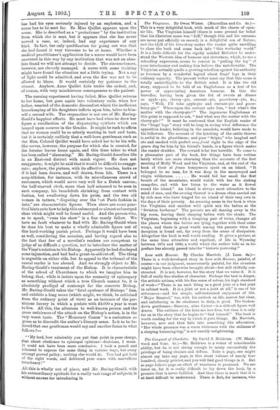The Virginian. By Owen Wister. (Macmillan and Co. 6s.)— This
is a very delightful book, with much of the charm of open- air life. The Virginian himself (there is some ground for belief that his Christian name was "Jeff," though this and his surname are never put officially on record) is a delightful son of Nature, and the idyll of his love-story makes the reader quite unwilling to close the book and come back into "this workaday world." It is a little difficult for the rigidly minded Britisher to under- stand the Western idea of humour and cleverness, which, to use a schoolboy expression, seems to consist in "pulling the leg" of your interlocutor and making him believe the unbelievable. The Virginian actually quells a growing rebellion against his authority as foreman by a wonderful legend about frogs' legs in their culinary capacity. The present writer must say that this scene is totally unintelligible to the British mind. It is like the old story, supposed to be told of an Englishman as a test of his power of appreciating American humour. In this the traveller, having been given the list of sweets at dinner as apple - pie, cherry - pie, currant - pie, gooseberry - pie, &c., says, "Well, I'll take apple-pie and currant-pie and goose- berry-pie." Whereupon the servant asks him, "And what's the matter with the cherry-pie ?" The ingenuous Englishman at this point is supposed to ask, "And what was the matter with the cherry-pie ? " It must be confessed that the English reader of the "frogs' legs" story will be long in seeing what difference the opposition leader, believing in the anecdote, would have made to his followers. The account of the lynching of the cattle thieves is awful in its ghastliness ; and poor "Scipio," who laughed and ate and smoked with perfect sangfroid right to the edge of the grave dug for him by his friend's hands, is a figure which makes the reader shudder. The coward is far less horrible. To come to a pleasanter part of the book, few things have been written lately which are more charming than the accounts of the first meeting of Molly Wood and the Virginian, and, at the end of the book of their al fresco honeymoon spent on an island. "It belonged to no man, for it was deep in the unsurveyed and virgin wilderness. He would bid her smell the first breath of the mountains, would watch with her the sinking camp-fire, and with her listen to the water as it flowed round the island." An island is always most attractive to the mind of man, and the owning thereof is a dream often carried out by rich men who have longed for an island of their very own in the days of their poverty. In amusing scene in the book is when the Virginian and another wild spirit mix the babies at the "Swinton barbecue." The parents are all dancing away in the big room, leaving their sleeping babies with the cloaks. The Virginian, beginning with a tempting pair of twins, changes all the places where the babies are lying, together with their outer wraps, and there is great wrath among the parents when the deception is found out, far away from the scene of dissipation. Altogether the book is well worth reading. It gives a picture, at the same time attractive and repellent, of life in Wyoming between 1874 and 1890, a world which the author tells us in his preface has already passed into the "historic yesterday."






































 Previous page
Previous page